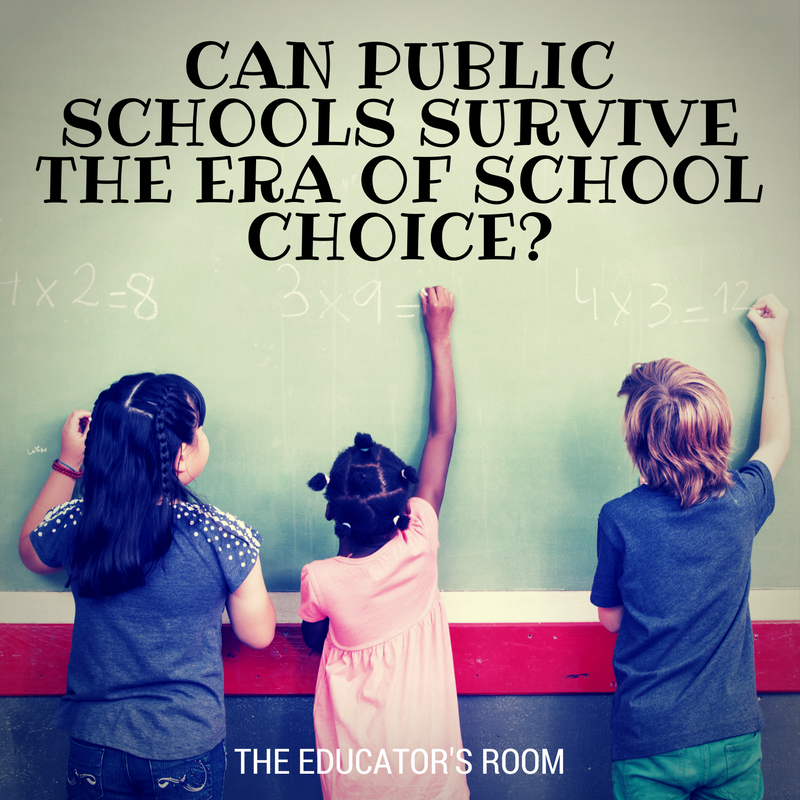Held every January, National School Choice Week is just around the corner. As we approach this date, I can’t help but think of how a single initiative has become one of the most controversial topics in education today. Proponents of school choice argue that vouchers empower parents to make choices for their child, based on their child’s unique needs, interests and learning styles. On the other hand, opponents of school choice and the voucher system assert that school vouchers take money away from the public school system, and vouchers do not benefit all students, since private schools still have the ability to pick and choose which students attend and could possibly discriminate against certain students. No matter what side you find yourself aligning with, the emotions surrounding this topic are definitely intense!!
One reason school choice has become a major point of contention is due to the fact that there are so many options for parents today. Our education institutions offer a wide range of school types, and parents are bombarded with choices that they may not have had just a few decades earlier. This can be especially tricky for parents to maneuver through as we learned in Jess’ December‘s blog, School Images Matter: What Do They Say? When it comes to school choice, everything is not as they appear to be. School vouchers are also not new. Although this debate over school choice has accelerated in recent years, according to the Economic Policy Institute, the idea of using public funding for private schooling dates back to the 1960s when civil rights activists began to argue for racial equality in the segregated public school system. Another reason why this is such a divided issue is one can argue that both sides have reasonably valid points.
Today, the argument for and against school choice and vouchers may look something like this…
Those advocating for school vouchers assert that-
- School vouchers empower parents to make the best choice in meeting the unique needs of their child.
- School vouchers eliminate the need for parents to pay twice for their children’s education: once in tax dollars and again in tuition costs.
- School vouchers meet children’s needs more effectively by allowing them to go to the school that is the best fit for them, rather than the one that is simply in the neighborhood.
- The government-run education system currently isn’t working; schools are failing and students are falling through the cracks.
- A voucher system promotes competition between area schools, which raises the bar on the standard of education throughout all schools, including public schools.
- Vouchers offer students in low-income areas with poorly performing schools a chance at a better education and the opportunity to break the cycle of poverty.
Source: King, 2013-Does School Choice Lead to Educational Equality? http://research.monm.edu/mjur/files/2011/04/School_Choice_2011.pdf
While some see the benefits of school vouchers as a step in the right direction, there are many who argue that there are several drawbacks to the system as well. Those who oppose a school voucher system often present the following arguments-
- School vouchers take money away from the public school system – and budgets currently are so tight in many school districts across the country, additional cuts could seriously undermine public education.
- Vouchers do not benefit all students, since private schools still have the ability to pick and choose which students attend their schools.
- School vouchers skim the best students away from the public school system, making it that much more difficult for public schools to make the grade on high stakes exam and get subsequent funding for higher scores.
- A school voucher system tends to divide the country, while public education serves to unite it.
Source: King, 2013-Does School Choice Lead to Educational Equality?http://research.monm.edu/mjur/files/2011/04/School_Choice_2011.pdf
The flames have intensified even more with the new pick/nomination for Secretary of Education. Even some proponents of expanding choice options are voicing deep concerns that this nominee favors an unbridled approach to school choice, with too little oversight and accountability. She is known as a champion of vouchers and an advocate for expanding charter schools in a broader push for greater school choice. Her lack of any experience or background in public education is unprecedented for this position. Furthermore, neither she, nor her children, have ever attended a public school. Her controversial confirmation hearing began yesterday. She was grilled aggressively on her stance to use this position to privatize education. Her hearing is likely to raise questions concerning her using the position of Secretary of Education to promote the expansion of private school voucher programs in public education. To be fair, this nominee has stated publically that she is for better quality education for all children, and she will be an advocate for public schools. However, based on her background, I am concern that the very best educational options will only be available to the affluent (to those who can afford to pay for it).
It saddens me that this issue has become so volatile, political and divisive. There are few topics as fiercely debated in the world of education today as school choice and voucher programs. The issue becomes particularly prevalent in areas where public schools are not making the grade. For me, the bottom line is how can we work together to give our kids the best education with opportunities to become a productive, contributing member of society? The issue should never be about Republicans versus Democrats or Liberals set against Conservatives. It should always start with what’s best for kids. I also believe part of the problem is not all of what’s being said about school choice is rooted in cold hard facts. There are common myths that circulate about school choice and voucher programs. Time magazine even published an interesting article entitled The 5 Biggest Myths about School Vouchers. This is why we have to continually educate the public and each other so we can make inform decisions as parents and as educators regarding school choice.
No doubt, school choice will continue to be a hot topic for parents and educators across this country; the issue will only intensified as we get ready to swear in our next president and all of his cabinet picks. It may be some time before enough voucher systems are put in place to provide sufficient research and data for a final determination on whether these programs can actually benefit the students they serve. Alaina Adams said it best, in her October blog “Oh the Places of School Choice,” when she posed these two questions: “So how can we cultivate a public education system that inspires students to choose to attend our neighborhood schools?” “If students could dream big, what might they want their neighborhood schools to look and sound like to meet the intersecting needs of their passions and academics?”
Ultimately, we’re all in this together, advocating for the same educational promise and opportunity that every child deserves.











Comments 2
This is a comprehensive portrayal of the situation. Thank you for that.
However, under “cons,” there’s a big one missing…students from poor socio-economic backgrounds will probably be unable to use them. If parents are worried about enough money for food, rent or other essentials, the chances of them being part of this debate are slim. This doesn’t even bring in the fact that vouchers don’t always cover the entire cost of private schools and that private schools don’t always provide transportation for these poorer families.
It’s a shame that people pushing for vouchers don’t seem to recognize the reality of so many of our students’ families.
Thank you for such a comprehensive and robust overview of this very salient (and controversial) topic. Especially considering our new Secretary of Education, I imagine that school choice and school vouchers are going to be at the forefront of most of our country’s discussions on education over the next four years.
Its very interesting to read about the “brain drain” that might happen as a result of school choice becoming commonplace. I have often read about this “brain drain,” or the movement of intellectual talent/skills elsewhere, in regards to teachers and the transition from public schools to charter schools. With that being said, I have not really given a ton of thought to the equally as troubling movement of students and their intellectual talent/skills once their parents have the ability to put them into higher performing schools.
It makes me worry greatly about the public schools in our country that are already sitting on the precipice of despondency.